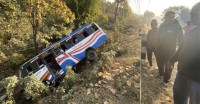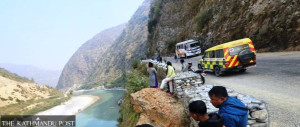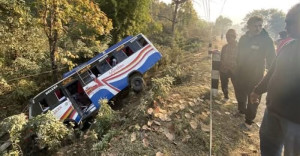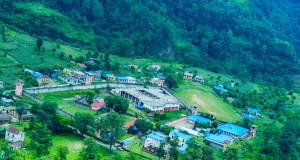Bagmati Province
Indigenous women step up as nature guides in Chitwan
Once bound to farms, they are now leading safaris and changing their communities’ attitude towards forest and wildlife.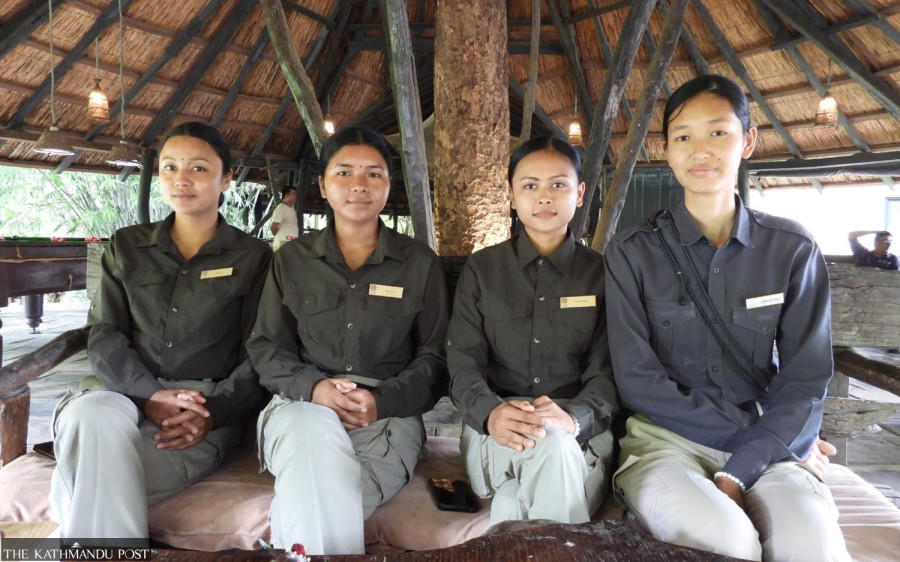
Ramesh Kumar Paudel
When Sudiksha Kumal of Meghauli first thought about becoming a nature guide in Chitwan, her parents were surprised. No one in her farming family had ever worked in tourism. But Sudiksha insisted.
Sudiksha, who grew up watching rhinos trample crops and tigers prey on cattle near her village in Meghauli, which lies in ward 28 of Bharatpur Metropolis, wanted something different.
“I once thought wild animals only brought problems to us. But living so close to the jungle also made me curious. I wanted to understand it better—and show others what we have,” said Sudiksha, who is in her mid-twenties.
Sudiksha’s chance came after her plans to study abroad fell through. Inspired by her cousin Mina, a trekking guide in a Kathmandu-based company, Sudiksha asked her father for support. “At first, no one in our family had ever joined tourism. But I wanted to try,” she recalled. Her father agreed, and she completed nature guide training in 2022.
“I had always heard from my cousin that guiding was a way to meet people and show them our country. I wanted to try something different too,” said Sudiksha.
Now employed at Barahi Jungle Lodge, Sudiksha regularly takes tourists into the forest of Chitwan National Park and its surroundings. The job is not without danger. She recalls facing a mother rhino and calf on a trail. “I had to keep the tourists calm. It’s risky, but we are trained to handle it. The jungle is full of surprises,” she said with a smile.
Her neighbour, Prabha Kumal, soon followed. “I saw Sudiksha working and thought, if she can do it, why not me?” she said. With encouragement from her parents, she too trained as a guide. “Farmers like my parents feel proud when their daughters lead foreign guests into the forest.”
Yet women like Sudiksha and Prabha remain rare. Meghauli Ghatgai Nature Guide Association has 114 members, but only five are women. “They may be few, but they are excellent,” said Manesh Kumar Limbu, chairman of the association. He pointed to Elina Chaudhary, who recently won the ‘Naturalist of the Year Award-2024’, as proof.
Elina, from Nawalparasi, followed her father’s footsteps into guiding. For others, like Sakina Chaudhary from eastern Chitwan, the path was less direct. “I studied hotel management and came to Barahi for an internship. Watching Sudiksha and Elina convinced me to switch careers,” she said. Now she too guides tourists through the jungle.
At Meghauli Serai, another luxury lodge, guide Swastika Mahato tells a similar story. “I used to work in food and beverage service. But when I saw two women guiding, I thought, I can do this too. They inspired me to change my life,” said Mahato of ward 22 of Patihani in Bharatpur.
According to the Chitwan Nature Guide Association, there are 464 trained nature guides around Sauraha alone, but only a few are women. Across the district, only 16-17 women work as professional guides.
For indigenous women, the barriers are especially steep. The job demands physical strength, confidence to face wild animals, and the ability to command authority in front of tourists—qualities long considered male roles. Social expectations in farming families also restrict daughters’ choices.
But change is slowly unfolding. “Women guides are breaking stereotypes,” said Limbu. “Their success proves skill, not gender, determines ability. And their presence strengthens conservation.”
For the women themselves, the work is both liberating and rewarding. “I once thought I would need to go abroad for opportunities. Now I earn well here,” said Sudiksha. “Tourists, whether Nepali or foreign, respect our knowledge. No one doubts us.”
Prabha has a similar view. “We are not only earning but also giving our villages recognition. People around the world learn about our culture and forests through us, she said.
The transformation is more than personal. Families that once saw wildlife only as threats now see value in protecting them. “When you guide tourists, you realise animals are our partners. Conservation is not just about protecting animals, but also about creating futures for communities like ours,” said Sudiksha.
In Chitwan, where jungle lodges first brought international attention to Nepal’s wildlife six decades ago, a new story is being written—this time by indigenous women who are reshaping what it means to live beside the forest. “We grew up fearing the jungle. Now, we are proud to be its storytellers,” said Prabha.




 19.6°C Kathmandu
19.6°C Kathmandu1.jpg)

